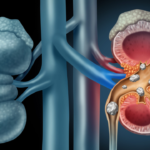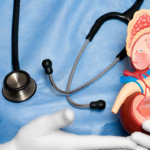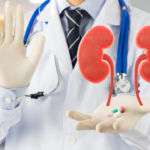
What are cystine stones?
A cystine stone is a form of kidney stone. Many people assume there is just one sort of kidney stone. But in truth, there are different varieties. A kidney stone is a solid chunk of material that develops in a kidney. It may remain in the kidney or migrate down the urinary system.
Cystine stones tend to return and are often more significant than other kidney stones. You should talk to a urologist professional if you acquire cystine stones. You may take things to minimize your chances of developing new stones. You may not know you have a cystine stone. It is crucial to get stones detected to receive the correct therapy for this issue.
Causes of Cystine Stones
Cystine stones are generated by an uncommon condition termed “cystinuria.” The disease causes a natural chemical called “cystine” to flow into your urine. When there is too much cystine in the urine, kidney stones might develop. These stones can become lodged in the kidneys, bladder, or elsewhere in the urinary tract. The majority of persons who have cystinuria have recurrent stones. It is a chronic illness that can only be managed, not treated, throughout a lifetime.
How can you know if you have cystinuria?
Cystinuria manifests as symptoms only when a stone is present. Kidney stones vary in size from as little as a grain of sand to as large as a grain of sand. Others grow to reach the size of a pebble or even a golf ball. Symptoms may include the following:
Urinary discomfort
- Urine with blood Sharp discomfort in the side or back (almost always on one side)
- Pain in the vicinity of the groyne, pelvic, or abdomen
- Vomiting and nausea
In which people are cystinuria most likely to occur?
Cystinuria is a hereditary condition that affects the kidneys. A genetic flaw is anything handed on from one generation to the next by a deficiency in a particular gene. It is necessary to inherit the cystinuria gene from both parents to be diagnosed with the condition. Cystinuria affects around 1 in every 7,000 persons globally. According to recent research, most persons with cystinuria create their first stones in their twenties or thirties, with 30-40 percent of people acquiring cystine stones during their adolescent years. However, some individuals experience their first cystine stone beyond 40. Cystine stones can develop in children as well. In fact, according to some studies, cystine stones account for 8-10 percent of all kidney stones seen in youngsters.
How is Cystinuria treated?
The first step in treatment is to prevent stones from developing. This involves drinking more water, lowering salt, and eating less meat for adults and children. If these efforts are insufficient, you may also need to take a particular medication to prevent the formation of stones.
Consume more water – Consuming enough of water reduces the cystine’s potential to produce stones in the urine. Consult your healthcare provider about the amount of water you should drink each day to help prevent the formation of stones.
Alternating your diet – Cystine stones are less likely to develop in less acidic urine. Consuming more fruits and vegetables might help reduce the acidity of the urine. Consuming meat results in more acidic urine, which increases your chance of developing cystine stones.
Salt reduction – Consuming less salt can help prevent the formation of cystine stones. Avoid foods high in sodium, such as potato chips, French fries, sandwich meats, canned soups, and packaged meals.
Medicine – Specific individuals may also require prescription medication to prevent the formation of stones. Different medications act in unique ways. Certain varieties assist in keeping your urine less acidic. Other varieties contribute to preventing cystine stones by preventing crystals from colliding. Your healthcare professional can explain these many possibilities and assist you in selecting the most appropriate medication for you.
Conclusion
All that said, it is important to know what causes cystine stones and how to treat them. The more you know about your condition, the better equipped you will be to protect yourself from any future, possibly damaging symptoms. With the correct info, you’ll be able to live a more comfortable life, free of the pain and discomfort associated with cystinuria.




